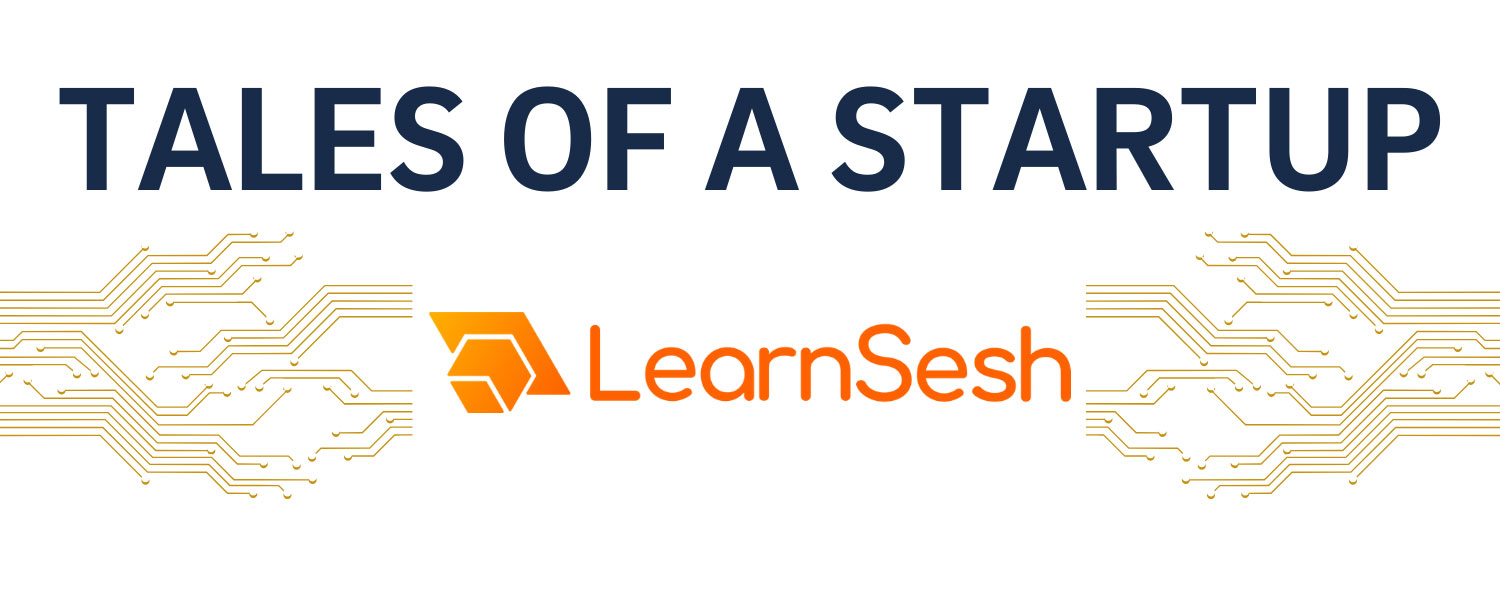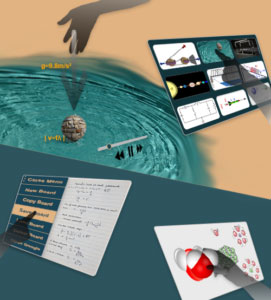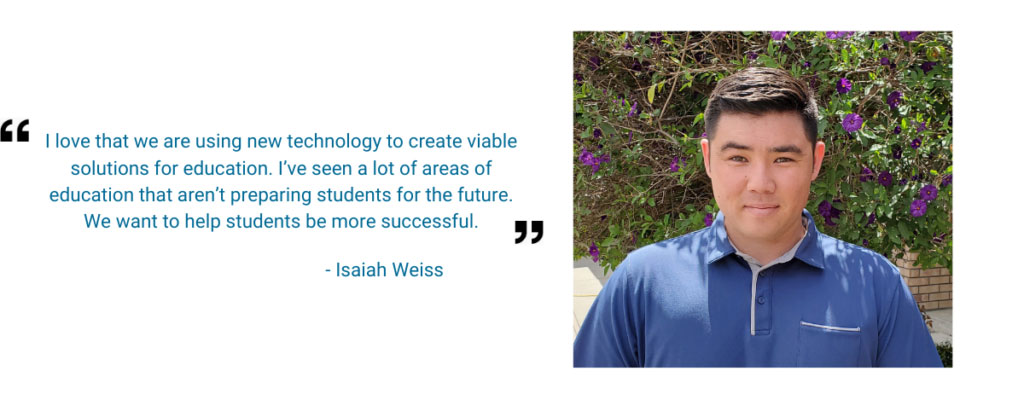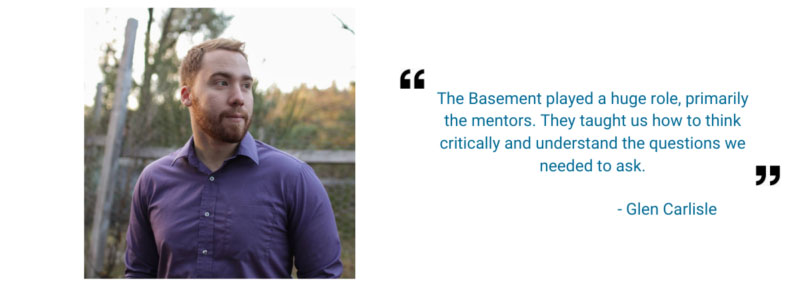
Alumni Founded LearnSesh Ushers In the Next Wave of VR Education
April 30, 2021
The future of education is here. UC San Diego alumni founded LearnSesh uses virtual reality to create more-effective learning experiences that provide equal access to resources, per-student accommodations and distraction-control.
Seeing tutoring as a nearly untouched market opportunity, LearnSesh was born as a VR Tutoring Software company, from founders Glen Carlisle ‘19 and Isaiah Weiss ‘20. During its evolution at UC San Diego, they were a part of The Basement's Incubator and Rady's StartR Impact Accelerator, passionate about breaking barriers to education.
After two recent accelerators (Mission Edge’s SAIL & Jacob’s School of Engineering IGE I-Corps), the team has pivoted towards creating solutions for overcoming learning obstacles in the 6-8 grade space - particularly for neurodiverse, science and math students.
From interactive content to immersive experiences, learn how their journey through the UC San Diego ecosystem prepared them for success.
What excites you about your work?
 GC: Making an impact. You might not like all the steps, but they are all heading towards a common goal. It’s amazing taking something from an idea to a full fledged company. Growing up, I had some learning experiences that made me believe everything was possible, and others that made me feel like nothing was. Often, I found it was access to resources and one-on-one help that made the difference.
GC: Making an impact. You might not like all the steps, but they are all heading towards a common goal. It’s amazing taking something from an idea to a full fledged company. Growing up, I had some learning experiences that made me believe everything was possible, and others that made me feel like nothing was. Often, I found it was access to resources and one-on-one help that made the difference.
Similarly, we are focused on middle school, where having the resources and ability to customize classroom experiences for the individual can have the biggest impact.
IW: I love that we are using new technology to create viable solutions for education. I had some problems with how my school experience was through high school. I’ve seen a lot of areas of education that aren’t preparing students for the future. We want to help students be more successful.

We are currently in paid pilots with tutoring firms - our first adopters - as well as talking to school administrators to validate expansion as a neurodiverse learning solution for school systems.
How did you first get involved with The Basement & the UC San Diego entrepreneurial community?
GC: I’ve always been interested in understanding problems and designing solutions, which went alongside my major - Interdisciplinary Computing and the Arts - where the focus was on using technology to create unique experiences. At UC San Diego I was introduced to the social business model, where solving a pain point could also lead to a larger impact.
I’m passionate about using extended reality (virtual/mixed/augmented reality) to improve the world and naturally gravitated to programs like TritonXR - which was complementary to my Basement involvement. I was helping Isaiah consult and advise, until the previous partner left. We participated in the S’19 Basement cohort with a strong focus on education.
IW: I was accepted into Rady's StartR Inclusion, a diversity and inclusion incubator, during my second year as a transfer student. It was here I first heard about The Basement, and where I began my entrepreneurial journey at UC San Diego.
It was between these accelerators, classes and working in due diligence at a local startup studio that I was able to further build my identity.
What campus resources have helped you throughout your student entrepreneurial journey?
GC: The Basement played a huge role, primarily the mentors. They taught us how to think critically and understand the questions we needed to ask. The wide range of perspectives were incredibly helpful. We went through StartR Impact, beginning of 2019/2020 - roughly one year ago!

IW: UC San Diego faculty are incredible resources. Professor Lamar Rutherford went out of her way to guide us even after her “Innovation to Market” course at Rady. Her feedback was invaluable, pushing us to think critically and better define our value proposition.
How did you balance being a full-time student while also running a startup?
GC: Balancing work at a startup as a full time student was easier than when working full time. You can treat it like a class and make the time, even when it doesn't seem like it is there. If you’re passionate about something, you’ll always find time for it.
IW: Blocking out time periods is critical to see where big chunks of work were going to happen. You can definitely take on too much! I had to figure out what to prioritize and de-prioritize.
What role have mentors played in your success/journey?
GC: Mentors have helped guide us in the right direction - teaching us to think the right way, rather than just giving answers. Good advice early on was to focus on the people who get your product, rather than waste time trying to convince someone who isn’t ready. Mentors have also been very open with their network connections.
IW: Mentors have helped us develop our business model and made us better entrepreneurs. Gloria, Jacques and Christine at The Basement have had a huge impact - from setting up last minute meetings to supporting us on a personal level external from the incubator. They are an incredible team.
Professor Zimmermann from Rady was another invaluable mentor. He would hop on the white board with me after class, go through development prioritization exercises on Zoom and ultimately helped us get paying customers.

What advice would you give to another UC San Diego student thinking about starting a company?
GC: Write things down in living documents - it helps ensure you make progress, and allows you to navigate clearly through complex thought processes.
IW: Make sure you love the problem and not the solution. We’ve made pivots but we’ve always been focused. This is what has kept us going. We are really passionate about overcoming inequalities in education.
We’re always excited to meet passionate people who want to make a change. Get in touch with us at our website.